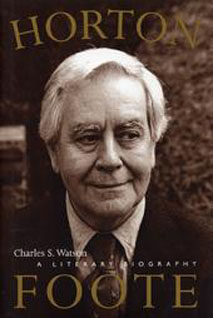| Horton Foote  Born: 14-Mar-1916 Born: 14-Mar-1916
Birthplace: Wharton, TX
Died: 4-Mar-2009
Location of death: Hartford, CT
Cause of death: Illness
Remains: Buried, Wharton City Cemetery, Wharton, TX
Gender: Male
Religion: Christian Science
Race or Ethnicity: White
Sexual orientation: Straight
Occupation: Playwright, Screenwriter Nationality: United States
Executive summary: To Kill a Mockingbird American dramatist Horton Foote was born in 1916 and left home at age 16 to become an actor. He moved to California and studied at the Pasadena Playhouse. While he appeared in some plays, including Only the Heart on Broadway in 1944, his career never took off. Agnes de Mille suggested that he switch to writing, and in 1941 he authored the play Texas Town, performed by the American Actors Company. New York Times drama critic Brooks Atkinson somehow witnessed a performance, and gave the play a good review.
During the war, Foote was ineligible for military service, and took a variety of odd jobs. In 1945 he married, and he and his wife operated the King Smith School for several years. He had not forgotten writing, and in 1950, NBC hired him to write ephemeral pieces for television. Aware of the wasted talent, the network asked him to write a series of one-hour teleplays. One of these, The Trip to Bountiful, with Lillian Gish and Eileen Heckart, eventually opened on Broadway, and more than three decades later appeared in film as The Trip to Bountiful. His teleplays were primarily broadcast on the showcases Television Playhouse and Playhouse 90.
Foote is best known for his 1962 adaptation of Harper Lee's novel, To Kill a Mockingbird. Starring Gregory Peck and Mary Badham, it is a charged story centered around the courtroom defense of a black man falsely accused of raping a white woman. It won three Academy Awards, including Best Screenplay Adaptation. While his reputation was cemented, his screenplay work was not appreciated by Hollywood producers. He adapted his play, The Travelling Lady, into Baby the Rain Must Fall (1965), but that was followed by instances where his scripts were essentially discarded. Foote switched back to drama.
An ambitious nine-play cycle, The Orphans' Home, is inspired by his father's family. The Young Man From Atlanta is an engaging story of a older couple coping with the reality of their dead son's homosexuality. It won the Pulitzer Prize for Drama in 1995. The Carpetbagger's Children (2002) is an unconventional character study of a deceased couple, related by their daughters. Dividing the Estate (2008) is a comedy set in the 1980s centered around a squabbling Texas family.
In the early 1980s, Foote's agent convinced him to write a screenplay. He began one inspired by his nephew, a struggling country singer. Foote's daughter suggested he write it specifically for Robert Duvall, whom he knew from Mockingbird. The result was the 1983 film Tender Mercies, directed by Bruce Beresford, and shot with a relatively small budget. It won an Academy Award for Duvall as Best Actor, and one for Foote for Best Original Screenplay. Tender Mercies gave Foote's career a second wind, and it gave him the ability to pursue a more independent path. Active up until the last, he died in 2009 after a brief illness. Father: Albert Horton Foote (clothing store owner)
Mother: Hallie Brooks (d. 1974)
Wife: Lillian Vallish (m. 4-Jun-1945, d. 5-Aug-1992, two sons, two daughters)
Son: Horton, Jr.
Son: Walter
Daughter: Hallie
Daughter: Daisy
Gore 2000
Oscar for Best Screenplay (another medium) 1963 for To Kill a Mockingbird
Oscar for Best Screenplay 1984 for Tender Mercies
Pulitzer Prize for Drama 1995 for The Young Man From Atlanta
Emmy 1997 for Old Man (writing, miniseries)
National Medal of Arts 2000
FILMOGRAPHY AS ACTOR
The Civil War (23-Sep-1990)
Requires Flash 7+ and Javascript.
Do you know something we don't?
Submit a correction or make a comment about this profile
Copyright ©2019 Soylent Communications
|